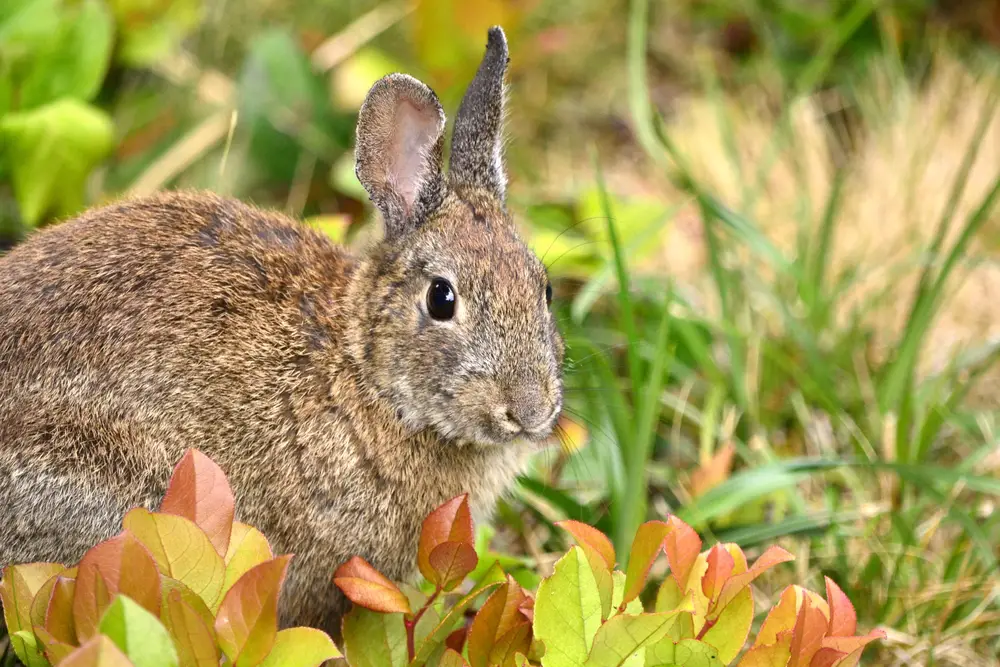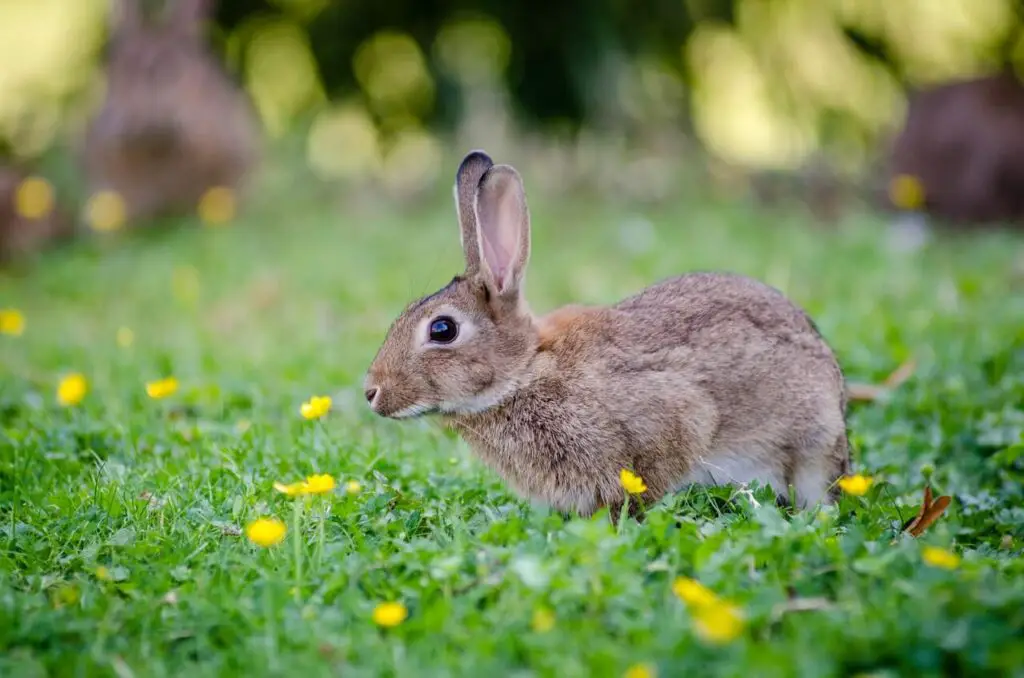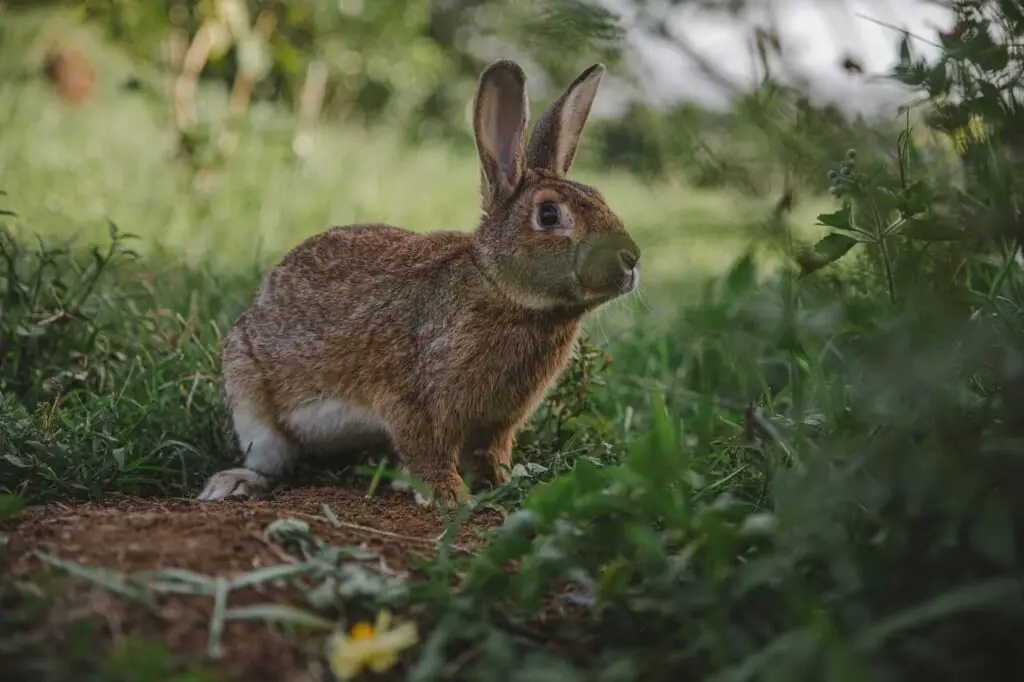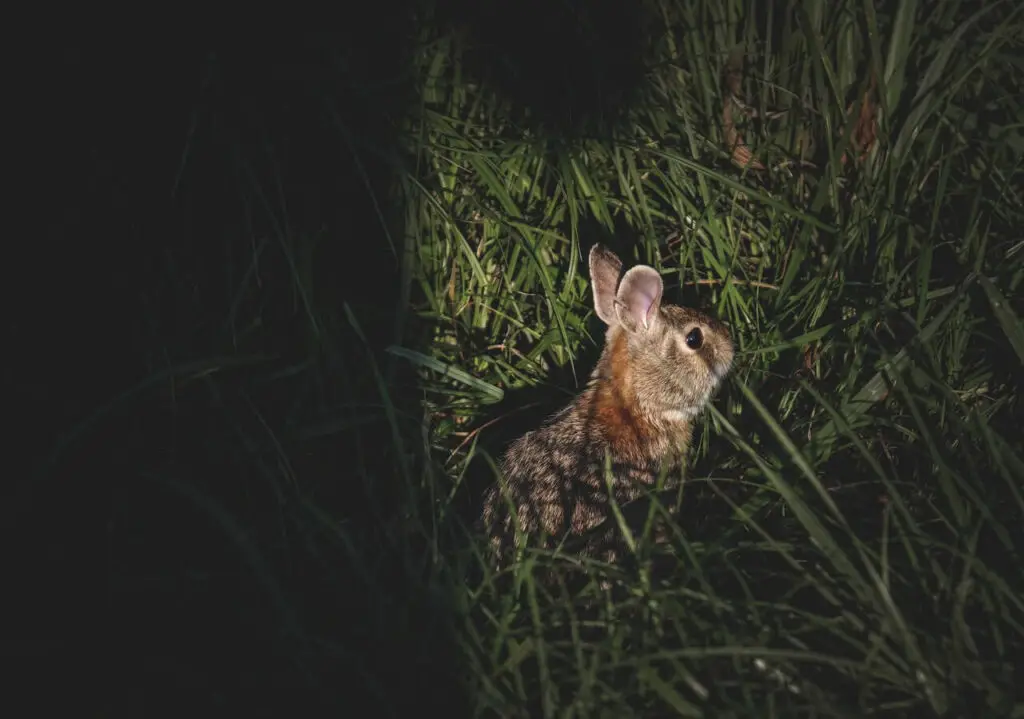You walk into your garden one day to find a small rabbit eating your plants like they’re his lunch for the day. Try scaring him away, and he’ll only look at you like you’re interrupting his meal. Rabbits in gardens are a pretty common issue among gardeners. If you’re one of the unlucky ones with bunnies in their backyards, you landed yourself on the right page. We’ll show you how to keep rabbits out of garden beds!

Table of Contents
How to Keep Rabbits out of Garden Beds

There are endless ways to keep rabbits out of your garden, but a lot of them include hurting the rabbits. Now, we don’t want that. Yes, no one likes a rabbit in their garden, but that doesn’t mean we’ll hurt the poor animal.
Here are seven different ways to repel the furry bunnies from your garden.
1. Install Fencing
When you’re dealing with any wildlife animal, installing a fence is the way to go. This may not be a feasible solution for a lot of people, but if you can do it, don’t hesitate. It’s the best way to keep rabbits, chickens, and even snakes out.
Opt for chicken wire with 1-inch mesh, and make sure it’s at least two feet high because rabbits are savvy jumpers.
If you want to make sure the rabbits won’t burrow under the fence, you can extend it below the ground by 4–6 inches. Alternatively, you can secure it to the ground, keeping the bottom edge tight.
2. Remove Nesting
If you’ve found any sign of rabbit nesting in your garden, the first step you should take is removing it. Next, you’ll want to eliminate any chances of the rabbits nesting again.
To do that, remove any nesting options, including dense vegetation and low shrubbery branches. Additionally, if you have any piles of wood, remove those, too.
There may be vegetation along your fence, as well. Remove it because the rabbits may use it to get in. Finally, seal any spaces that may be used for burrowing underneath the buildings.
3. Get Rabbit-Proof Plants
Another thing you can do is plant rabbit-proof plants in your garden. There are a lot of plants that rabbits don’t like being close to. If you’re looking to add a couple of new plants to your garden, you can opt for those to solve your rabbit problem.
Rabbits don’t like plants with strong scents, such as hot peppers, garlic, mint, basil, and spicy basil. Some rabbits also don’t like marigolds, but you can never tell if the rabbits in your garden dislike it or love it. The best option to stick to here is mint because it has a lovely smell for people, repels rabbits, and can be used in teas and culinary dishes.
There’s one thing to keep in mind, though. Baby rabbits aren’t as intelligent as their parents. They won’t know which plants they should stay away from, so you may find them hogging your repellent plant. If your problem is with a baby rabbit, it’s better to switch to any of the other solutions.
4. Protect Your Plants
If you can’t install fencing for any reason, you can instead protect the plants individually. This way, even if the rabbits get in the garden, they won’t find anything to feed on. The easiest way to do so is to install chicken wire with ¼-inch mesh in a cylindrical shape around the plants you want to protect.
Whether it’s a shrub, a tree, or even a vine, the wire will keep all unwanted animals out.
Instead of chicken wire, you can use hardware cloth, too. What’s important is that you bury the material deep into the ground to keep the rabbits from burrowing under it. Six inches into the ground will be enough.
5. Use Visual Tricks
As bright as rabbits are, they’re not as intelligent as humans. While a rubber snake won’t trick a human, it can do wonders for an invasive rabbit. There are a lot of visual tricks you can use to keep rabbits out of your garden.
You may add a metal pinwheel on a low height so that the rabbits will see it. They’ll be terrified of the movement and the shrieking sound it makes as it rotates.
Alternatively, you can use a rubber snake or a hawk statue. The rabbits will get tricked into thinking they’re real, and they’ll stay away from your garden.
No products found.
- Bird Deterrent Device for Outdoors: Red Trailed Hawk decoy is a bird scare device statue that keeps birds away. Similar to owl decoys, this hawk decoy scares birds away.
- Lifelike Design: Plastic Hawk Decoy is hand painted to give a lifelike design, perfect as a scarecrow for garden and outdoor areas. Predator eyes reflect light to frighten birds.
- High Quality Material: Made of high quality molded plastic for durability and realistic features to make the ideal bird scare device and fake hawk statue. Measures: 16 in Height x 7 in Width.
- Realistic Features: The mock predator eyes and realistic hawk design scare birds away creating a similar effect as a fake owl decoy and other bird scare devices. Place in garden, patio, porch or other outdoor areas.
- Installation Features: Remove bottom tab to fill with sand, attach to pole, or hang scarecrow hawk deterrent to get rid of birds like pigeons, sparrows and more!
Last update on 2025-03-28 / Affiliate links / Images from Amazon Product Advertising API
6. Create a Repellent Spray
There are multiple homemade rabbit repellent sprays that you can make to repel rabbits without hurting them.
Here are the ingredients for an effective spray:
- 2 tbsp cayenne pepper
- 1 tsp liquid soap
- 2 tbsp garlic powder
- 5 cups water
Pour all your ingredients into any old spray bottle you have, and shake it well to combine everything. To apply it, spray it on the plants in your garden that rabbits usually attack. It won’t hurt the plants, but it’ll keep the rabbits out.
Bear in mind, though, that your pets shouldn’t consume this mix. If your cat or dog tends to roam the garden a lot, it’s best to keep them inside when you’re spraying.
7. Get Predators
If you’re out of solutions, and you desperately want to get the rabbits out, you can resort to getting predators to do the job for you. Personally, I’m not a fan of this option; letting a fox or a snake roam around my garden isn’t a welcomed idea. However, when nothing else has worked, you’ll need to improvise, and doing it won’t seem so absurd anymore.
Predators that will scare away rabbits include foxes, owls, snakes, and even dogs. If you have a family dog who’ll not hurt the rabbits, you can let him roam the garden and chase away any rabbits there. A dog breed that has hunting instincts will be ideal in this case.
Why Not Use a Chemical Repellent?
You may wonder why I haven’t included chemical repellents in my list since most people use them and recommend them. I believe they do more harm than benefit for a lot of reasons.
For starters, when you apply them to trees and vines, they create an unpleasant smell. They also form a sticky surface that doesn’t look appealing. On top of that, they’re highly toxic. If you have family pets, it won’t be safe to let them roam freely with chemical repellents sprayed on the plant.
Not to mention, if you have edible plants in your gardens, such as vegetables or fruits, you won’t be able to spray them. They’ll become inedible, which defies the purpose of growing them in the first place.
Lastly, chemical repellents aren’t a permanent solution. They only work for a short time, and you have to reapply them. Applying them too often on some plants will ruin them. It’s better to stay clear of them and go for any of the other solutions, instead.
Why Do Rabbits Get in Your Garden in the First Place?

It’s understandable why animals like snakes would get inside a garden. It’d search for chickens, birds, and mice to feed on — but why do rabbits get inside? They’re not predatory animals, why are they bothering with your garden?
Well, there are multiple reasons why rabbits may venture inside your garden. Below, we’ll be exploring the many reasons why a rabbit may be visiting your home.
Lots of Food
The primary reason for rabbits getting inside your garden is food. They know backyards are like an open buffet, containing all kinds of plants they can feast on. Rabbits are also known to be avid eaters. They’ll eat your plants until there’s nothing left, and they may eat flowers, too.
You may wonder, “why don’t they hunt for food in the wild, and stay clear of my garden?”
Well, the answer to that question is pretty easy. When collecting food from your garden, they don’t have a predatory animal breathing down their necks. Additionally, it’s less likely that owls or hawks will be watching them from tree branches, looking for the right moment to attack in a populated area like your home.
Your garden is a safe place to find food, and that’s primarily why rabbits sneak inside.
Tip: If you have elevated beds in your garden, the rabbits won’t be able to get to them. With no chance to get food, they’ll leave to wherever they came from.
Breeding
Rabbits are known for being rapid breeders, sometimes laying up to 60 babies in a single season. Their breeding season starts in mid-February and goes on until August’s end. In those six months, you can expect to find a lot of rabbits in your garden, looking for a safe place to mate and have babies.
In this case, it’s imperative to get rid of them. Rabbits can birth dozens of babies. You don’t want your garden to be bombarded by little bunnies. Not to mention, bunnies mature exceptionally fast. Shortly after, they’ll start breeding, themselves.
Weather Conditions
Weather conditions can be a huge contributor to the number of rabbits hogging your garden. For starters, rabbits are more likely to sneak into gardens in the winter or very harsh summers when food is scarce in the wild.
Your garden may also provide a water supply for them to drink from. During a drought, the rabbit’s seeking for water becomes more urgent.
Another problem with the summer is the scorching heat. Rabbits are known to overheat when the weather becomes too hot. They’ll also become anxious, so they’ll try to find a cool place to protect them in your garden.
On top of that, during wildfires, rabbits have no option but to go into gardens and try to find food. In that case, they may try to breed, as well, because their natural habitat isn’t safe for that anymore.
Safe Zone
Rabbits aren’t predatory creatures. That means they’re prone to being prey to any predator passing by. The list goes long, but a rabbit’s predators mainly include wolves, foxes, and wild cats. A lot of prey birds feed on rabbits, as well; the most prominent ones being hawks and owls.
To escape the hungry teeth and talons of predators, rabbits rush off to gardens and backyards nearby. They know that they’ll only find humans there, and they’re not as scared of us as they are of wolves and coyotes.
If the garden has a fence that the rabbits can burrow underneath, it’ll be an optimal choice for them. This way, the predator won’t be able to follow them.
How Do I Know If Rabbits Are Getting in My Garden?

This may come as a surprise to you, but you won’t always catch the rabbits in action. You may not be seeing any rabbits, but that doesn’t mean they don’t come by your garden every day.
Rabbits are crepuscular creatures. That means they’re mainly active during dawn and dusk (likely when you’re asleep). So, there’s a high chance they’ve been getting into your garden without your knowledge.
To know for sure, there are a couple of things to look for, such as pea-sized droppings. If you see them scattered around the garden, a rabbit probably left them. You may also see plants with trimmed ends. They’ll look like someone did them with a pruner because rabbits have lower and upper incisors.
Other signs of rabbits to look for are dug spots and hoses that have chewing markings on them. There may also be young plants disappearing.
Final Thoughts
Although rabbits are adorable creatures, they’re a nuisance to have in your garden. They’ll feed on your plants, and they may dig small burrows that’ll attract other small creatures. Getting rid of them is essential to restore your garden’s beautiful state.
Now that you have a guide on how to keep rabbits out of garden beds, hopefully you’ll be able to repel any rabbits that come around!
